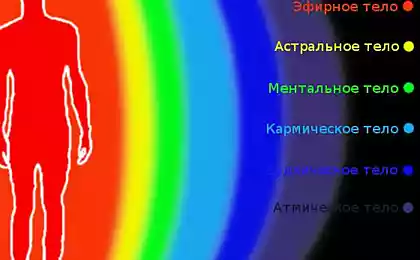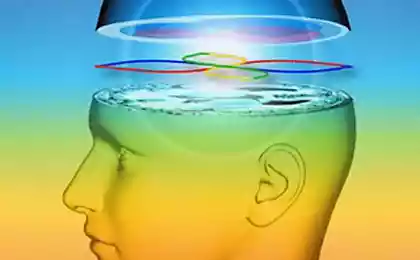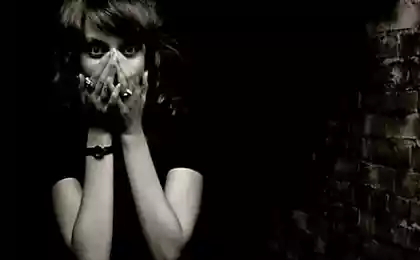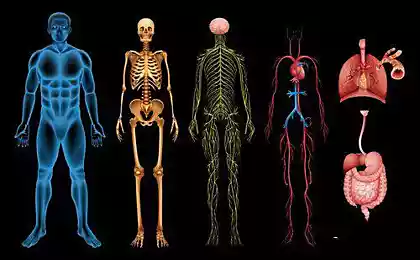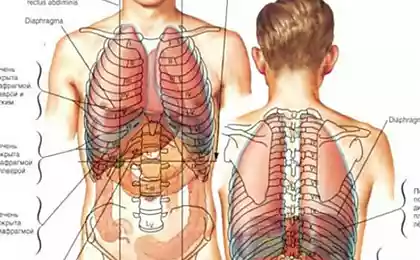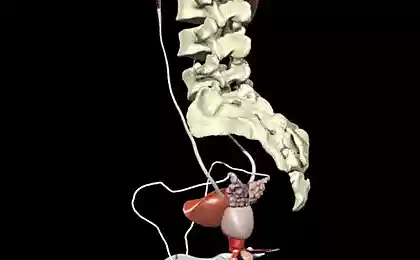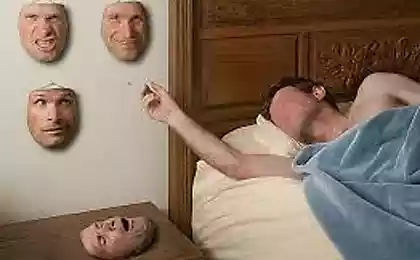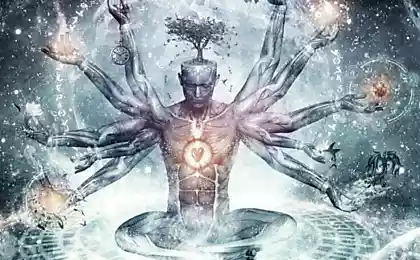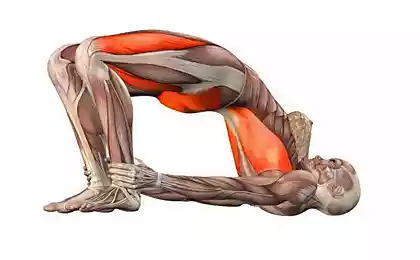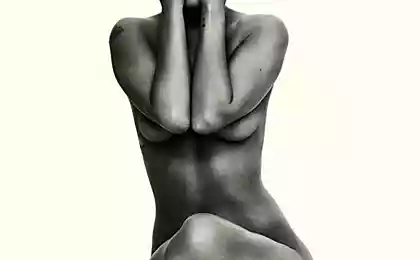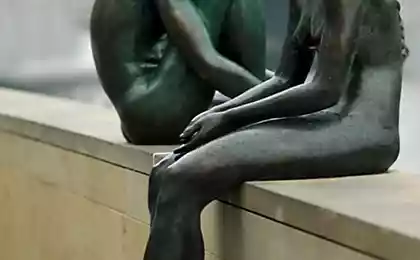503
How to reconnect mind and body
As a rule, certain emotions find an outlet in certain areas of the body. Most likely you do not cry, you do not cry with your knees and do not experience orgasm with their elbows. Therefore if the block is in a certain area, we can assume that is suppressed and constrained by the associated emotion.
Most people constantly feel some stiffness and tension in the neck, eyes, diaphragm, shoulders or lower back. Numbness and numbness often felt in the pelvic area, genitals, heart, lower abdomen or extremities.
It is important to do everything possible to find where is located your blocks.
Forty nine million nine hundred seventy thousand three hundred nineteen
At this stage do not try to get rid of them. In the best case it will do nothing, at worst you will strengthen them. Just find where they apparently are, and mentally note their location.
Precisely defining these blocks, you can begin the process of dissolution.
But first, let's consider, what do these blocks – these are fixed in the body region or zone stiffness, pressure and voltage.
In the ego of man can resist impulses or emotions, denying that they belong to him. Using the mechanism of egoic projection people can prevent awareness of a particular shadow tendency. If he's hostile, but denies its hostility, it will throw it outward, and thus feel that the world ganged up on him. In other words, the result of projecting the hostility he would experience anxiety and fear.
How do you suppress in the body level strong emotion which seeks discharge in some activity?
In the case of strong hostility and anger, you can defuse these emotions in such activities as cheering, screaming and waving his fists. These muscular actions Express the very essence of animosity. Thus, if you are going to suppress the hostility, you can achieve this only by the physical suppression of the discharge of such muscle action. More precisely, you should use some of their muscles to restrain the action of some other muscles.
In the result, the war begins muscles. Half your muscles struggling to defuse the hostility by swinging his fists, while the other half strains to prevent it. The conflict ends in a draw, but very intense, with high consumption of energy, which is not shown in any movements.
By suppressing hostility you may, will compress the muscles of the jaw, throat, neck, shoulders and upper arms because the only way you can physically "contain" the hostility. Rejected and hostility, as we have seen, usually back into the mind as fear. Therefore, when you once again experience a surge of irrational fear, notice that the shoulders you have drawn and raised, is an indication that you have to keep the hostility and, consequently, feel the fear. But in your shoulders themselves you will no longer feel the desire to someone to reach out and ask him a thrashing; you will no more experience of hostility; you'll experience stronger tension, stiffness and pressure. You have a block.
Any block, any sustained sense of tension or pressure in the body is muscle contain some taboo impulse or feeling. The fact that these blocks are muscular is an extremely important point, and we'll be back soon.
In the meantime, just note that these blocks and areas of tension arise as a result of two muscle groups, creating thus a mini-border. One group seeks to defuse the momentum, the other to keep it.
It is an active deterrence represents the suppression in the full sense of the word: you literally push yourself in certain areas of the body instead of to give vent to the impulse associated with the area.
Fifty two million seventy four thousand five hundred twenty one
Although the basic procedure of this process is simple to understand and easily accomplished, achieving sustainable results requires much more work, effort and patience.
You probably spent on the creation of the block not less than fifteen years, so do not be surprised if, after fifteen minutes of operation, it will not disappear without a trace. These, like any other border in consciousness is dissolved, time is necessary.
The first thing that should be noted, all of these blocks of muscle. Each block is actually a reduction, stiffness, spasm of a muscle or group of muscles. And we are talking about groups of skeletal muscles, and any skeletal muscle we can control at will. The same muscles that you arbitrarily use to move your arm, chew, walk, jump, clench his fist or to beat up the same muscles involved in each physical block.
But it does mean that the mentioned blocks are not involuntary– more than that, they physically can't be. They do not occur by accident. They represent something that we are actively creating our own.
But, curiously, we don't know that create them. We cut these muscles, and although we know that they are shortened and tense, we don't know that we are actively downsizing them. When there is such a block, we can't relax the muscles, as simply not know that reducing their. So it seems that these units arise quite spontaneously (and all other unconscious processes), and we seem to be helpless victims of forces outside our control.
The most important question is not, "how do I remove or relax these units," but rather, "how can I see that I am actively creating them."
If you pinch yourself, but don't know it, ask someone else to stop the pain useless. The question itself is about how to stop pinching yourself, implies that you do not. On the other hand, when you will see that actively pinching ourselves, then and only then will you be able to stop doing it. The question "how to stop pinching yourself" is akin to the question of "how to raise my hand." Both actions are arbitrary.
Thus, the key challenge is how to directly feel how I stretch these muscles, and therefore the only thing I really do is to try to relax them. On the contrary, I must, as always, to act in reverse.
I must do what I never would have thought: I have actively and consciously trying to improve test voltage. Deliberately increasing the tension, I do my "slowianie" of the unconscious actively conscious. In short, I begin to remember how I was pinching myself. I see how I literally pounced on himself. This understanding is felt again and again, releasing the energy that was going to fight muscle, and I can now send out to the outside world, and not inward on yourself.
But there is another no less important aspect of dissolving these blocks. First, as we have just seen, is to deliberately increase the pressure or voltage by an even greater reduction of active muscle. Thus, we begin consciously to do what was formerly done unconsciously. But do not forget that originally these blocks bodily tension performed a very important function – they were used to resolve feelings and impulses, which seemed at the time, dangerous, forbidden or unacceptable. These units were and are forms of resistance to particular emotions. So if they are hard to dissolve, you eventually have to open yourself up to those emotions that are hidden beneath the muscle spasm.
It should be emphasized that these "hidden emotions" are not some wildly insatiable and totally irresistible orgiastic; it is not some kind of demonic possession, and not the blind lust to kill his father, mother and siblings.
Most often, these suppressed emotions are much more moderate, although may seem bright because you had so long a muscular to hold them.
The release of these emotions usually entails tears, the cries, the emergence of the capacity for unlimited orgasm, a flash of anger or a short but violent attack on the pillows, prepared for this purpose.
Even if you're invaded by some extremely strong negative emotion – for example, explosive anger is especially worrying is not necessary, as it is not the main part of your personality.
When in a theatrical setting on stage for the first time enters a character, the views of the entire audience turn to him, even if he plays in the play the minor role. Similarly, when the stage of your consciousness for the first time, goes kind of negative emotion, she can completely capture you, although actually there is only a small fragment of your emotional world. Much better to come to the forefront, than wandered somewhere behind the scenes.
Anyway, when you begin to consciously take responsibility for increasing the degree of muscular tension in different body units, as a rule, by itself there is such an emotional release, a spontaneous outbreak of some pent-up emotions.
Starting deliberately to reduce the appropriate muscles, you begin to remember what this reduction prevents.
For example, when you see that your friend here is about to cry, and say "come on, Come on, whatever it is, allow yourself that" he'll probably burst into tears. At this point he's intentionally trying to keep the body from something natural, and knows that trying to do it, so emotions are hard to hide underground. Similarly, when you deliberately take control of the activities of their units, trying to increase their tension, hidden emotions can start to surface and manifest itself.
In General, this experiment on the consciousness of the body can be carried out as follows. After the location of some unit – say, a sense of tension in the jaws, throat, and temples – shift your consciousness, to feel where there is tension and which muscles it apparently involved.Then start slowly to increase the tension and the pressure, in this case, to reduce arbitrarily the muscles of the throat and clenching his teeth. When you are experimenting with increased muscle pressure, remember that you do not just reduce the muscles, you are actively trying to restrain something. If you have a typical stable block, to obtain a noticeable result, it will need to work about fifteen minutes a day not less than a month. The unit can be considered withdrawn when the attention-the feeling gets the opportunity quite freely to pass through this area on the way to infinity.
Thanks to such a simple healing the gap between mind and body, voluntary and involuntary, deliberate and spontaneous, is an important change in the feeling and reality. To the extent that you can feel your involuntary bodily processes as yourself, you can begin to take for granted those diverse processes which you cannot control. You can become easier to accept the lack of control and surrender to the spontaneity of faith in a deeper "I" which is something more than a murmur ego with his volitional control. You can learn to accept yourself, you don't have to control yourself.
Further, the adoption of voluntary and involuntary as yourself means that you no longer feel like a victim of your body or involuntary spontaneous processes in General. You develop a deep sense of responsibility – not in the sense that you begin to consciously control everything that happens and therefore responsible for everything, and that no longer anyone to blame or to thank for that experience. Ultimately, it is you the underlying source, which produces all your spontaneous and random process; you are not their victim.
The adoption of the involuntary as yourself does not mean you can control him. You cannot force your hair to grow faster, the stomach to stop growling, and the blood flow to reverse. Realizing these processes as the same as arbitrary, you give up this eternal and hopeless programs, and gaining power over the whole universe, from the obsession with the manipulation and indispensable control of themselves and their world.
Paradoxically, with this awareness comes a wider sense of freedom. Your ego can consciously deal with only two or three things at once. However, your body as a whole in this very moment without any help from the ego coordinates the literally millions of processes at once, from the intricacies of digestion to the complexities of the transmission of nerve impulses and coordination of the perceived information. This requires a wisdom infinitely greater than those superficial tricks that are the pride of the ego. The more we are able to remain at the level of the centaur, the more you can rely in your life on this storehouse of natural wisdom and freedom. published
©Ken Wilber.S. And remember, only by changing their consumption — together we change the world! ©
Source: www.kineziology.ru/readarticle.php?article_id=60
Most people constantly feel some stiffness and tension in the neck, eyes, diaphragm, shoulders or lower back. Numbness and numbness often felt in the pelvic area, genitals, heart, lower abdomen or extremities.
It is important to do everything possible to find where is located your blocks.
Forty nine million nine hundred seventy thousand three hundred nineteen
At this stage do not try to get rid of them. In the best case it will do nothing, at worst you will strengthen them. Just find where they apparently are, and mentally note their location.
Precisely defining these blocks, you can begin the process of dissolution.
But first, let's consider, what do these blocks – these are fixed in the body region or zone stiffness, pressure and voltage.
In the ego of man can resist impulses or emotions, denying that they belong to him. Using the mechanism of egoic projection people can prevent awareness of a particular shadow tendency. If he's hostile, but denies its hostility, it will throw it outward, and thus feel that the world ganged up on him. In other words, the result of projecting the hostility he would experience anxiety and fear.
How do you suppress in the body level strong emotion which seeks discharge in some activity?
In the case of strong hostility and anger, you can defuse these emotions in such activities as cheering, screaming and waving his fists. These muscular actions Express the very essence of animosity. Thus, if you are going to suppress the hostility, you can achieve this only by the physical suppression of the discharge of such muscle action. More precisely, you should use some of their muscles to restrain the action of some other muscles.
In the result, the war begins muscles. Half your muscles struggling to defuse the hostility by swinging his fists, while the other half strains to prevent it. The conflict ends in a draw, but very intense, with high consumption of energy, which is not shown in any movements.
By suppressing hostility you may, will compress the muscles of the jaw, throat, neck, shoulders and upper arms because the only way you can physically "contain" the hostility. Rejected and hostility, as we have seen, usually back into the mind as fear. Therefore, when you once again experience a surge of irrational fear, notice that the shoulders you have drawn and raised, is an indication that you have to keep the hostility and, consequently, feel the fear. But in your shoulders themselves you will no longer feel the desire to someone to reach out and ask him a thrashing; you will no more experience of hostility; you'll experience stronger tension, stiffness and pressure. You have a block.
Any block, any sustained sense of tension or pressure in the body is muscle contain some taboo impulse or feeling. The fact that these blocks are muscular is an extremely important point, and we'll be back soon.
In the meantime, just note that these blocks and areas of tension arise as a result of two muscle groups, creating thus a mini-border. One group seeks to defuse the momentum, the other to keep it.
It is an active deterrence represents the suppression in the full sense of the word: you literally push yourself in certain areas of the body instead of to give vent to the impulse associated with the area.
Fifty two million seventy four thousand five hundred twenty one
- So, if you find tension around the eyes then you could hold back the urge to cry.
- If you find tension and pain in my temples and, without noticing, clenching of the jaw. you may be trying to prevent anger, cry or laugh.
- Tension in the shoulders and neck evidence suppressed or pent-up anger, rage, or hostility,
- The tension in the diaphragm suggests that you chronically restrict and restrain the breath, trying to control the manifestation of wayward emotions or attention-feeling in General. (Most people holding back the breath during any act of self-control.)
- The tension in the lower abdomen and pelvic region usually means that you suppress the consciousness of your sexuality that you squeezed and shut down this area to prevent the flow of energy and vital force of the breath. If this happens – regardless of reason – you lose most of the sensations in the legs.
- And tension, lack of flexibility or strength in the legs usually shows a lack of rootedness, stability, zazemlenie or balance in General.
Although the basic procedure of this process is simple to understand and easily accomplished, achieving sustainable results requires much more work, effort and patience.
You probably spent on the creation of the block not less than fifteen years, so do not be surprised if, after fifteen minutes of operation, it will not disappear without a trace. These, like any other border in consciousness is dissolved, time is necessary.
The first thing that should be noted, all of these blocks of muscle. Each block is actually a reduction, stiffness, spasm of a muscle or group of muscles. And we are talking about groups of skeletal muscles, and any skeletal muscle we can control at will. The same muscles that you arbitrarily use to move your arm, chew, walk, jump, clench his fist or to beat up the same muscles involved in each physical block.
But it does mean that the mentioned blocks are not involuntary– more than that, they physically can't be. They do not occur by accident. They represent something that we are actively creating our own.
But, curiously, we don't know that create them. We cut these muscles, and although we know that they are shortened and tense, we don't know that we are actively downsizing them. When there is such a block, we can't relax the muscles, as simply not know that reducing their. So it seems that these units arise quite spontaneously (and all other unconscious processes), and we seem to be helpless victims of forces outside our control.
The most important question is not, "how do I remove or relax these units," but rather, "how can I see that I am actively creating them."
If you pinch yourself, but don't know it, ask someone else to stop the pain useless. The question itself is about how to stop pinching yourself, implies that you do not. On the other hand, when you will see that actively pinching ourselves, then and only then will you be able to stop doing it. The question "how to stop pinching yourself" is akin to the question of "how to raise my hand." Both actions are arbitrary.
Thus, the key challenge is how to directly feel how I stretch these muscles, and therefore the only thing I really do is to try to relax them. On the contrary, I must, as always, to act in reverse.
I must do what I never would have thought: I have actively and consciously trying to improve test voltage. Deliberately increasing the tension, I do my "slowianie" of the unconscious actively conscious. In short, I begin to remember how I was pinching myself. I see how I literally pounced on himself. This understanding is felt again and again, releasing the energy that was going to fight muscle, and I can now send out to the outside world, and not inward on yourself.
But there is another no less important aspect of dissolving these blocks. First, as we have just seen, is to deliberately increase the pressure or voltage by an even greater reduction of active muscle. Thus, we begin consciously to do what was formerly done unconsciously. But do not forget that originally these blocks bodily tension performed a very important function – they were used to resolve feelings and impulses, which seemed at the time, dangerous, forbidden or unacceptable. These units were and are forms of resistance to particular emotions. So if they are hard to dissolve, you eventually have to open yourself up to those emotions that are hidden beneath the muscle spasm.
It should be emphasized that these "hidden emotions" are not some wildly insatiable and totally irresistible orgiastic; it is not some kind of demonic possession, and not the blind lust to kill his father, mother and siblings.
Most often, these suppressed emotions are much more moderate, although may seem bright because you had so long a muscular to hold them.
The release of these emotions usually entails tears, the cries, the emergence of the capacity for unlimited orgasm, a flash of anger or a short but violent attack on the pillows, prepared for this purpose.
Even if you're invaded by some extremely strong negative emotion – for example, explosive anger is especially worrying is not necessary, as it is not the main part of your personality.
When in a theatrical setting on stage for the first time enters a character, the views of the entire audience turn to him, even if he plays in the play the minor role. Similarly, when the stage of your consciousness for the first time, goes kind of negative emotion, she can completely capture you, although actually there is only a small fragment of your emotional world. Much better to come to the forefront, than wandered somewhere behind the scenes.
Anyway, when you begin to consciously take responsibility for increasing the degree of muscular tension in different body units, as a rule, by itself there is such an emotional release, a spontaneous outbreak of some pent-up emotions.
Starting deliberately to reduce the appropriate muscles, you begin to remember what this reduction prevents.
For example, when you see that your friend here is about to cry, and say "come on, Come on, whatever it is, allow yourself that" he'll probably burst into tears. At this point he's intentionally trying to keep the body from something natural, and knows that trying to do it, so emotions are hard to hide underground. Similarly, when you deliberately take control of the activities of their units, trying to increase their tension, hidden emotions can start to surface and manifest itself.
In General, this experiment on the consciousness of the body can be carried out as follows. After the location of some unit – say, a sense of tension in the jaws, throat, and temples – shift your consciousness, to feel where there is tension and which muscles it apparently involved.Then start slowly to increase the tension and the pressure, in this case, to reduce arbitrarily the muscles of the throat and clenching his teeth. When you are experimenting with increased muscle pressure, remember that you do not just reduce the muscles, you are actively trying to restrain something. If you have a typical stable block, to obtain a noticeable result, it will need to work about fifteen minutes a day not less than a month. The unit can be considered withdrawn when the attention-the feeling gets the opportunity quite freely to pass through this area on the way to infinity.
Thanks to such a simple healing the gap between mind and body, voluntary and involuntary, deliberate and spontaneous, is an important change in the feeling and reality. To the extent that you can feel your involuntary bodily processes as yourself, you can begin to take for granted those diverse processes which you cannot control. You can become easier to accept the lack of control and surrender to the spontaneity of faith in a deeper "I" which is something more than a murmur ego with his volitional control. You can learn to accept yourself, you don't have to control yourself.
Further, the adoption of voluntary and involuntary as yourself means that you no longer feel like a victim of your body or involuntary spontaneous processes in General. You develop a deep sense of responsibility – not in the sense that you begin to consciously control everything that happens and therefore responsible for everything, and that no longer anyone to blame or to thank for that experience. Ultimately, it is you the underlying source, which produces all your spontaneous and random process; you are not their victim.
The adoption of the involuntary as yourself does not mean you can control him. You cannot force your hair to grow faster, the stomach to stop growling, and the blood flow to reverse. Realizing these processes as the same as arbitrary, you give up this eternal and hopeless programs, and gaining power over the whole universe, from the obsession with the manipulation and indispensable control of themselves and their world.
Paradoxically, with this awareness comes a wider sense of freedom. Your ego can consciously deal with only two or three things at once. However, your body as a whole in this very moment without any help from the ego coordinates the literally millions of processes at once, from the intricacies of digestion to the complexities of the transmission of nerve impulses and coordination of the perceived information. This requires a wisdom infinitely greater than those superficial tricks that are the pride of the ego. The more we are able to remain at the level of the centaur, the more you can rely in your life on this storehouse of natural wisdom and freedom. published
©Ken Wilber.S. And remember, only by changing their consumption — together we change the world! ©
Source: www.kineziology.ru/readarticle.php?article_id=60
Alexander Roitman: If you do not have enough money spend all the money they have and earn more!
Mysteries Russian lullaby



